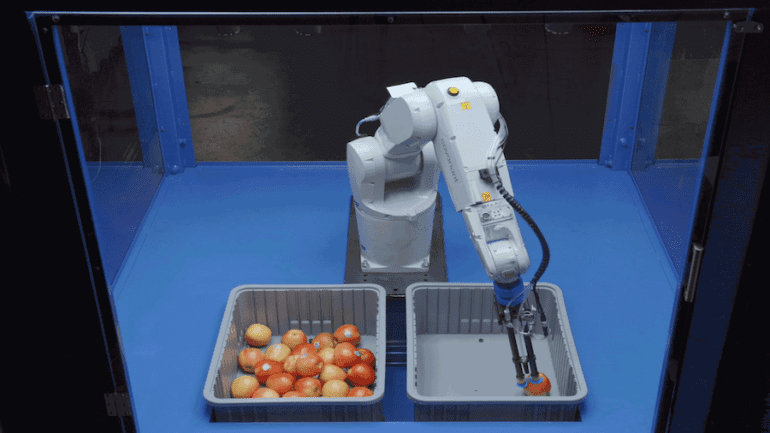- Covariant introduces RFM-1, a foundational robotics model that enables human-like reasoning capabilities in robots.
- RFM-1’s versatility allows for extensive adaptation through additional data training, promising scalability across diverse applications.
- Covariant’s independent data collection approach outpaces collaborative efforts, leveraging its fleet of warehouse robots.
- RFM-1 serves as a predictive engine for suction-based object manipulation, incorporating various data streams for comprehensive insights.
- The model’s ability to transcend familiarity constraints empowers it to tackle novel scenarios and adapt to diverse robotic platforms.
- RFM-1 operates as a proficient simulation tool, accurately forecasting complex interactions, even with challenging objects.
- Covariant emphasizes the necessity of diverse data inputs to realize the vision of ubiquitous robotics integration.
Main AI News:
Covariant directed its attention towards the picking application, recognizing its potential to deliver immediate value. Warehouse companies engage Covariant’s robots for efficient item picking operations, making it a pivotal use case. However, the true excitement lies in the wealth of real-world manipulation data accumulated over the past four years, paving the path for groundbreaking advancements.
In a recent announcement, Covariant introduced RFM-1, touted as a foundational robotics model empowering robots with human-like reasoning capabilities. While terms like “human-like” and “reason” warrant caution, the innovation showcased by Covariant is undeniably remarkable.
Termed as a “foundation model,” RFM-1 holds the promise of versatile adaptation through additional data training. Although currently optimized for warehouse manipulation, its potential extends far beyond, with the capacity to evolve alongside diverse datasets. Pieter Abbeel, co-founder of Covariant, emphasizes the platform’s scalability, envisioning a future where robotics foundation models drive global automation endeavors.
Covariant’s strategy hinges on the accumulation of vast amounts of data facilitated by its extensive fleet of warehouse robots. This data reservoir serves as the cornerstone for training RFM-1, boasting a staggering 8 billion parameters.
Diverging from collaborative approaches, such as the RT-X project, Covariant relies on independent data collection, leveraging its robotic fleet’s capabilities. Abbeel highlights the exponential data growth, underlining Covariant’s capacity to outpace conventional methods.
RFM-1’s current iteration operates as a predictive engine tailored for suction-based object manipulation within warehouse environments. Integrating various data streams, including images, videos, joint angles, and force readings, RFM-1 offers comprehensive predictive insights. Its interconnected architecture enables seamless predictions, ranging from images to actionable robot commands.
What sets RFM-1 apart is its ability to transcend familiarity constraints, empowering it to tackle novel scenarios and adapt to diverse robotic platforms. Foundation models, like RFM-1, excel in generalization, eliminating the need for continuous retraining and facilitating seamless integration with new systems.
The notion of “understanding” within RFM-1 is grounded in its extensive experience rather than traditional cognitive processes. Acting as a proficient simulation tool, RFM-1 accurately forecasts complex interactions, even with inherently challenging objects.
Abbeel elucidates on RFM-1’s unique simulation capabilities, likening its predictive prowess to a learned physics engine. By leveraging expansive datasets, RFM-1 achieves unparalleled accuracy in simulating real-world scenarios.
To realize the vision of ubiquitous robotics integration, Covariant emphasizes the necessity of diverse data inputs. An adaptable data ingestion engine lays the groundwork for RFM-1’s continuous evolution, welcoming contributions from various robotic platforms.
Covariant’s value proposition lies in its ability to facilitate real-world autonomy for robotics companies. By harnessing the collective knowledge embedded within RFM-1, Covariant promises unmatched performance and reliability in manipulation tasks.
The company’s long-term ambition revolves around establishing itself as a leader in robotics foundation models. With sufficient data, compute power, and advanced algorithms, Covariant aims to pioneer a universal AI platform for robotics, marking a significant milestone in the realm of automation.
Conclusion:
Covariant’s unveiling of RFM-1 marks a significant leap forward in robotics, promising unparalleled scalability, adaptability, and predictive capabilities. The company’s independent data collection approach and emphasis on diverse data inputs position it as a frontrunner in the evolving landscape of automation, paving the way for the widespread adoption of universal AI platforms in robotics.

